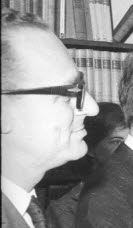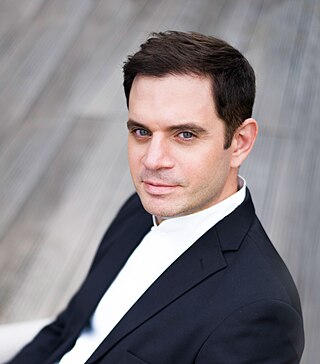Paul Theissen (born 1937) is a German pianist, conductor and choral conductor.
Paul Theissen (born 1937) is a German pianist, conductor and choral conductor.
Born in Aachen, Theissen studied piano, conducting and composition as well as trombone and double bass at the Hochschule für Musik und Tanz Köln. He passed the A-examination in organ in Aachen.
From 1961 to 1966, Theissen was a répétiteur at the Deutsche Oper am Rhein in Düsseldorf and from 1967 to 1973, conductor and from 1969 director of studies at the Staatstheater Mainz. From 1974 to 1980, he was also conductor and solo répétiteur at the Stadttheater Bern. In 1980, he became first Kapellmeister at the Landestheater Coburg. From 1982 to 1985, he was General Music Director there. He then lived in the United States for three years, where he worked with the symphony orchestras in Tennessee and Riverside. In 1991, he became music director at the Theater Plauen-Zwickau . [1]

Michael Andreas Gielen was an Austrian conductor and composer known for promoting contemporary music in opera and concert. Principally active in Europe, his performances are characterized by precision and vivacity, aiding his ability to interpret the complex contemporary music he specialized in.

Ferenc Fricsay was a Hungarian conductor. From 1960 until his death, he was an Austrian citizen.

Paul Dessau was a German composer and conductor. He collaborated with Bertolt Brecht and composed incidental music for his plays, and several operas based on them.
Heinz Rögner was a German conductor. He was born in Leipzig.
Felix Prohaska was an Austrian conductor and professor of musicology in Hanover.

Peter Paul Fuchs was an Austrian-born conductor and composer, best known for his conducting appointments with American orchestras and for his teaching. He was also a prolific composer although little of his music survives in performance. His writings include two influential music text books.

Leo Spies was a Russian-born German composer and conductor active in the musical and theatrical life of Germany, and especially in Berlin.

Christopher Ward is a British conductor. In August 2018 he became the music director of Theater Aachen.
Reinhard Peters was a German operatic conductor, violinist and an academic teacher at the Folkwangschule Essen. He was the Generalmusikdirektor for the opera companies Deutsche Oper am Rhein, Theater Münster and Deutsche Oper Berlin. He premiered music in opera and concert, such as Giselher Klebe's Die tödlichen Wünsche, Aribert Reimann's Melusine, Nicolas Nabokov's Love's Labour's Lost, and Wilhelm Killmayer's song cycle Tre Canti di Leopardi.
Georg Dohrn was a German conductor and pianist, who worked in Munich and Breslau. Inspired by Johannes Brahms to pursue music, he collaborated with notable musicians and composers of his era.
Eberhard Kloke is a German conductor and composer.
Hans Albert Oskar Stieber was a German conductor, composer and violinist. He was the founding director of the Hochschule für Theater und Musik in Halle an der Saale.
Ulrich Windfuhr is a German conductor.
Franz Jung was a German pianist, music educator and conductor.
Gerhard Friedrich Wilhelm Pflüger was a German conductor.
Hans Jürgen Wenzel was a German conductor and composer. He was chairman of the Verband der Komponisten und Musikwissenschaftler der DDR and professor for musical composition at the Hochschule für Musik Carl Maria von Weber Dresden.
Hans Walter Kämpfel was a German conductor, composer and Generalmusikdirektor in Aachen and Bremen.
Constantin Trinks is a German conductor.
Albert Bittner was a German conductor and Generalmusikdirektor.

Camillo Hildebrand was a German composer and conductor of Czech origin. He was an opera conductor of the opera houses of Heidelberg, Mainz and Mannheim, as well as the Berlin Philharmonic and Blühner Orchestra, which he founded.